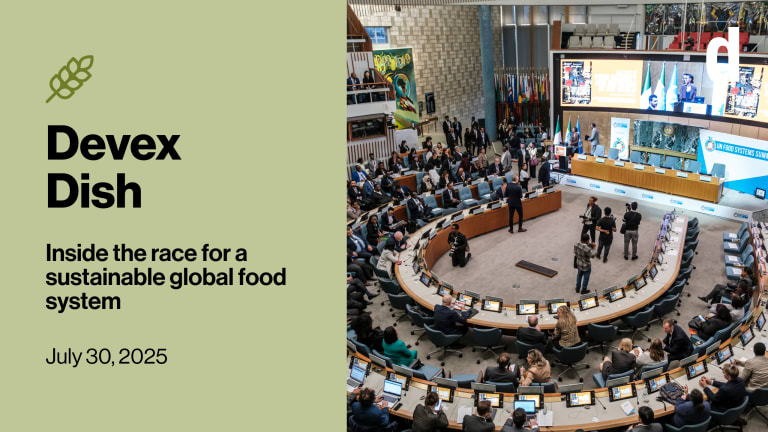
The Global People’s Summit on Food Systems kicked off Tuesday with calls to end “the global corporate food empire” and with harsh criticism of the United Nations’ first Food Systems Summit, which is set to take place Thursday.
The GPS is a three-day event that will culminate in on-the-ground and online protests against the U.N. food summit. Rallies will take place at U.N. headquarters in New York, in front of a U.N. country office in Indonesia, and in front of the Philippines Department of Environment and Natural Resources.
Faith groups lead call to defund industrial agriculture in Africa
A network of faith-based and civil society organizations in Africa has called on donors to stop funding the Alliance for a Green Revolution in Africa and other programs promoting industrialized agriculture on the continent.
Organizers have dubbed the GPS a “counter-summit” to the U.N. food event, adding that they only expect “more of the same” from the U.N. at its summit. The GPS is organized by 22 regional and international organizations that aim to present “an actionable, pro-people and pro-planet alternative to radically transform the food systems.”
Sylvia Mallari, global co-chairperson of the People’s Coalition on Food Sovereignty and one of the organizers of the GPS, said there were clear “signs of corporate capture” in the lead-up to the U.N. food summit.
She cited the appointment of Agnes Kalibata, president of the Alliance for a Green Revolution in Africa, as the U.N. secretary-general’s special envoy for the Food Systems Summit, as well as the partnership between the U.N. and the World Economic Forum — which she described as “the largest lobby forum of billionaires … affecting control especially in food and agriculture” — as signs of a business takeover.
“The corporate capture of the U.N. food summit really represents a real reality that corporations own and control the means, processes, and resources in food and agriculture [and] that billionaires … are more powerful than elected governments and civil societies combined [in] shaping the world policies,” Mallari said.
Ahead of the U.N. food summit, civil society groups criticized its lack of emphasis on “the transformation that the corporate food systems need to undergo.” The GPS will include an event on “Transforming food systems through people-led agroecology” and other discussions to address these concerns.
Helena Norberg-Hodge, the founder of nonprofit Local Futures, called for a radical departure from the status quo to improve food systems.
“To create more just and sustainable food systems, it’s pretty obvious what we need to do,” she said. “We need to do the exact opposite of what our governments have been doing for a very long time now.”
She said governments have been pushing farmers to focus on monoculture for crop export and supporting global traders at the expense of farmers, communities, and national economies.
The opening ceremony of the GPS featured testimonies from Indigenous farmers from the global south on how they envision an equitable, healthy, and sustainable food system.
Get the inside track on how agriculture, nutrition, sustainability, and more are intersecting to remake the global food system in this weekly newsletter.
Sarojeni Rengam, the executive director at Pesticide Action Network’s Asia-Pacific regional center, said the U.N. food summit lost any legitimacy in “representing the aspiration of poor, hungry, and marginalized people of the world for a truly radical food systems transformation” by ignoring their voices.
She said although the U.N. food summit projects inclusiveness and democratic participation, it remains unclear how the agenda addresses the demands of small landless farmers, Indigenous peoples, rural workers, women, and young people, as well as other marginalized interests.
“What is clear is that the U.N. FSS has ignored the structural causes of hunger and poverty. These are rooted in the global food systems being dominated and exploited for profits by unaccountable transnational corporations,” she said.
“If food systems were really to be transformed, if hunger, poverty, and maldevelopment were to be truly addressed in a sustainable way, we must resist and defeat imperialism.”
But Mallari warned that this kind of action is unlikely to happen at the U.N. food summit this year, as the event will most likely result in more technology-focused approaches to increase production as the answer to hunger, malnutrition, and famine.
“What do we expect in the coming food summit when the organizers and the leaders of the summit are dishing out more of the same thing,” she said. “More business as usual.”









